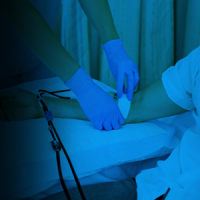
Enhancing laboratory classes through a Virtual Techniques Centre Faculty Spark - View, reflect and apply
Last updated on 09/10/2019
-
You must be signed in to access this function
1
Description
Dr Joanne Lewohl has produced a series of videos which aim to increase the level of student engagement in laboratory classes at Griffith University.
Challenge
The key to successful practical classes is pre-laboratory preparation, both on the part of students and staff. In an ideal world, the students are provided with the practical notes in advance and come to the laboratory class prepared and ready to perform the experiments.
Realistically, we are attempting to give the students experience in techniques that are often quite challenging and require an experienced hand to ensure success. So, how can we allow students to gain experience when by definition, they need to have the experience in order for the experiments to be successful?
Approach
Laboratory classes are a key component of student learning in scientific disciplines. These classes are designed to teach concepts and practical skills to students through experience – the students come into the laboratory class, run their own experiments, collect and interpret their own data and then answer questions or write a report to consolidate their learning.
The School of Medical Science currently offers laboratory classes in a number of different disciplines including basic biology, biochemistry, microbiology, immunology, genetics and molecular biology as well as the applied disciplines of histology, haematology and transfusion science. These classes typically involve an introduction or briefing to the whole class and often include a demonstration of the key techniques to be completed in the class session. The ‘whole class’ demonstration is usually performed by an academic staff member, but in large courses where the same experiment is run over multiple sessions, demonstrations often fall to the Sessional staff members employed as laboratory demonstrators. Students then break into small groups (2 – 3) to complete the required tasks and gather their data. The laboratory classes often conclude with a discussion of how the data is to be analysed and a review of key concepts.
The success of the experimental work strongly influences the student learning experience so it is vital that the experiments in each practical are ‘pre-tested’ to ensure that they work adequately. However, ‘pre-testing’ is often performed by highly experienced and highly skilled Technical Services staff, so even a well-thought out and well-tested experiment may fail in the hands of a relatively inexperienced student. This issue is magnified in large classes where, in some instances, the sessional staff may not have direct experience in the experiments being run on a particular day, or there are simply too many students in the class to view the ‘whole class’ demonstrations.
In order to improve student engagement in laboratory classes and to facilitate and promote deeper understanding of laboratory techniques we created a series of videos in which key fundamental experiments are demonstrated. The videos are made available through the course site on Learning@Griffith and students have access in advance of the actual practical class. We have created videos across a range of core disciplines as well as some highly unique and challenging experiments conducted in our more specialist programs.
These videos are also available to sessional staff employed as laboratory demonstrators to ensure that students receive consistent information across multisession lab classes. The use of these videos for pre-laboratory preparation enhances the conceptual understanding of students during class time and reduces cognitive load thereby improving the learning outcomes for students in these classes.
Outcomes
- Students have a deeper understanding of lab techniques
- They receive consistent information
- Content is available 24/7
Support Resources
-
Pipetting: Correct Technique
Category: General
-
Pipetting: Choosing the correct pipet
Category: General
-
Using a balance to measure weight
Category: General
-
Light Microscopy: Correct Use and selection of Lens
Category: Microscopy
-
How to light a Bunsen burner
Category: Microbiology
-
Microbiology: How to pour an agar plate
Category: Microbiology
-
How to prepare a bacterial lawn
Category: Microbiology
-
How to prepare a 16 streak plate
Category: Microbiology
-
How to prepare a 16 streak plate II
Category: Microbiology
-
Clinical Genetics: Making an agarose gel
Clinical Genetics/Molecular Biology
-
Clinical Genetics: Loading and running an agarose gel
Clinical Genetics/Molecular Biology
-
Clinical Genetics: Setting up a PCR
Clinical Genetics/Molecular Biology
-
Clinical Genetics: Setting up a restriction enzyme digest
Clinical Genetics/Molecular Biology
-
Clinical Genetics: Mounting chromosomes on to slides
Clinical Genetics/Molecular Biology
Contributed by
-
Griffith Health
School of Medicine
Dr Joanne Lewohl
(07) 555 27096
j.lewohl@griffith.edu.au
http://orcid.org/0000-0002-7577-0734
Griffith Experts profile -
Learning Futures
Licence
© 2024 Griffith University.
The Griffith material on this web page is licensed under a Creative Commons Attribution NonCommercial International License (CC BY-NC 4.0). This licence does not extend to any underlying software, nor any non-Griffith images used under permission or commercial licence (as indicated). Materials linked to from this web page are subject to separate copyright conditions.
Preferred Citation
(2019). Enhancing laboratory classes through a Virtual Techniques Centre. Retrieved from https://app.secure.griffith.edu.au/exlnt/entry/7528/view

